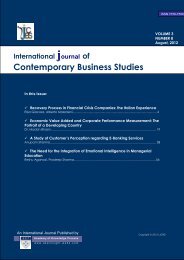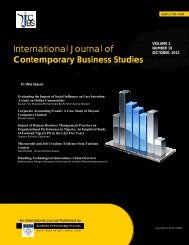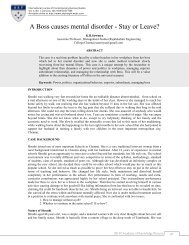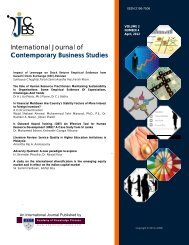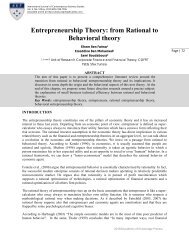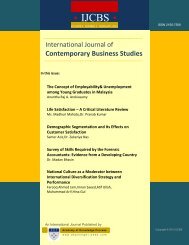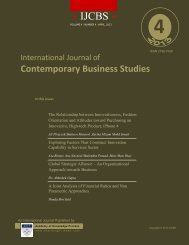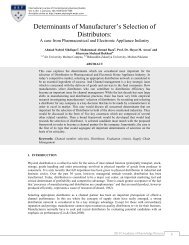International journal of Contemporary Business Studies
International journal of Contemporary Business Studies
International journal of Contemporary Business Studies
Create successful ePaper yourself
Turn your PDF publications into a flip-book with our unique Google optimized e-Paper software.
<strong>International</strong> Journal <strong>of</strong> <strong>Contemporary</strong> <strong>Business</strong> <strong>Studies</strong><br />
Vol: 3, No: 6. June, 2012 ISSN 2156-7506<br />
Available online at http://www.akpinsight.webs.com<br />
interested in the literature <strong>of</strong> management accounting for a long time as an important subject.<br />
Indeed, the basic utility <strong>of</strong> the subject comes from increasing importance <strong>of</strong> determining<br />
dimensions <strong>of</strong> budgetary participation‟s effects on managers‟ performance in the present<br />
competitive conditions for firms.<br />
From psychological and cognitive perceptions, there are two advantages <strong>of</strong> managers‟<br />
participation in budgeting process. First, owing to identification and ego-involvement with<br />
budget objectives, participation is associated to performance and so, leads to enhanced<br />
motivation and commitment to the budget (Brownell, 1982; Shields & Shields, 1998). The<br />
second reason is improving flow <strong>of</strong> information between superiors and subordinates, budgetary<br />
participation leads to good decision making. From this standpoint, participation escorts to higher<br />
motivation, higher commitment, higher quality decisions and consequently higher performance.<br />
2. LITERATURE REVIEW AND HYPOTHESES DEVELOPMENT<br />
The effect <strong>of</strong> budgetary participation on the organizational performance has been the subject <strong>of</strong><br />
considerable research in management accounting (Chong et al., 2005).Early empirical studies<br />
used a universalistic approach to examine the effect <strong>of</strong> budgetary participation. However, the<br />
results have been mixed (Murray, 1990; Kren, 1992; Chong et al., 2005; Jermias & Setiawan,<br />
2008).<br />
Subsequent studies have attempted to reconcile the conflicting results by adopting a contingency<br />
approach (Brownell, 1982a; Govindarajan, 1986; Chong et al., 2005). The empirical evidence<br />
generated by these studies suggests that contingency factors such as locus <strong>of</strong> control (Brownell,<br />
1982, 1983), perceived environmental uncertainty (Govindarajan, 1986), leadership style<br />
(Brownell, 1983), decentralization (Gul et al., 1995), role ambiguity and role conflict (Chong &<br />
Bateman, 2000), and feedback (Chong & Chong, 2002a) have an impact on participationperformance<br />
linkage.<br />
The present work aims to extend this field <strong>of</strong> research by examining another contingent variable,<br />
namely level <strong>of</strong> competitiveness, which is an important external environmental factor.<br />
Competitiveness has been identified as a major reason for companies to choose a customerfocused<br />
strategy for gaining a competitive edge (Porter, 1979). It has been suggested that<br />
managers will always be faced with problems associated with market conditions in their routine<br />
planning and controlling behaviors.<br />
The budgetary participation gives legitimacy to individuals to discuss problems <strong>of</strong> their<br />
organization with their superiors, it can also provide a framework within which people can<br />
exchange information and ideas to solve problems and agree on future actions, this may affect<br />
the performance <strong>of</strong> their businesses (O‟Connor, 1995). However by adopting a contingent<br />
approach, Chong et al., (2005) argues that, under conditions <strong>of</strong> low competition, companies are<br />
focusing more on short-term trading. It follows that managers don‟t need to collect market<br />
information for planning purposes.<br />
It is further argued that managers in firms facing intense market competition are more likely to<br />
make greater use <strong>of</strong> multiple performance measures in their attempt to trace the various market<br />
Copyright © 2012. Academy <strong>of</strong> Knowledge Process<br />
39



